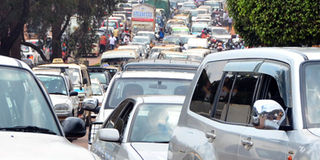Govt asked to draft new laws to control Kampala traffic jam

Corruption. Motorists stuck in traffic jam in Kampala. PHOTO BY MICHAEL KAKUMIRIZI
What you need to know:
- Mr Gerald Ekinu, the principle economist from the Ministry of Works and Transport, said taxi and bus operators must be trained extensively to boost their capacities.
- To combat traffic jam, Mr Byamukama noted that KCCA is currently undertaking road construction works under the second phase of the World Bank-funded Kampala Infrastructural Institutional Development Project with signalised junctions to control flow of traffic.
Kampala. Urban planners have asked government to formulate urban transport policies that will mitigate the current congestion in Kampala city and neighbouring municipalities.
The stakeholders argued that the current inadequate public transport system and traffic jam in Kampala is caused by the absence of the relevant laws.
Speaking during a dialogue on urban public transportation and traffic management in Kampala city recently, several stakeholders faulted government for the confusion.
“For instance, majority motorists don’t know what they want on the roads and they don’t care whether they are in wrong or not. Secondly, operators of commercial vehicles don’t have the necessary requirements such as driving permits, making the entire business uncontrollable,” said Mr John Mark Mwanika, the coordinator of Amalgamated Transport and General Workers Union.
Mr Mwanika wondered why there is lack of coordination among the different government agencies to improve the city transport system.
“At times you find that the policies made by KCCA are contrary to those made by the ministry of Transport,” he said.
Ms Immaculate Natukunda, the acting secretary of the Transport Licensing Board (TLB), said although there are bodies mandated to manage transport in the city, the prevailing environment is not favourable.
“Majority of commercial transport users are defiant and that’s why you see confusion on many city roads,” said Ms Natukunda.
However, some participants blamed the mess in urban transport on politicians, whom they accused of bypassing existing institutions to deal directly with commercial transport users.
They alluded to the recent incident where taxi operators blocked President Museveni’s convoy and reported to him that KCCA was charging exorbitant monthly fees.
Mr Gerald Ekinu, the principle economist from the Ministry of Works and Transport, said taxi and bus operators must be trained extensively to boost their capacities.
Others also faulted government for the poor traffic flow, which they said affects people’s productivity.
Mr Jacob Byamukama, the KCCA director for roads management, said although Kampala city had been planned for about 300,000 people in the 1970’s, the number has since soared due to more than a million, causing congestion in the city.
To combat traffic jam, Mr Byamukama noted that KCCA is currently undertaking road construction works under the second phase of the World Bank-funded Kampala Infrastructural Institutional Development Project with signalised junctions to control flow of traffic.


